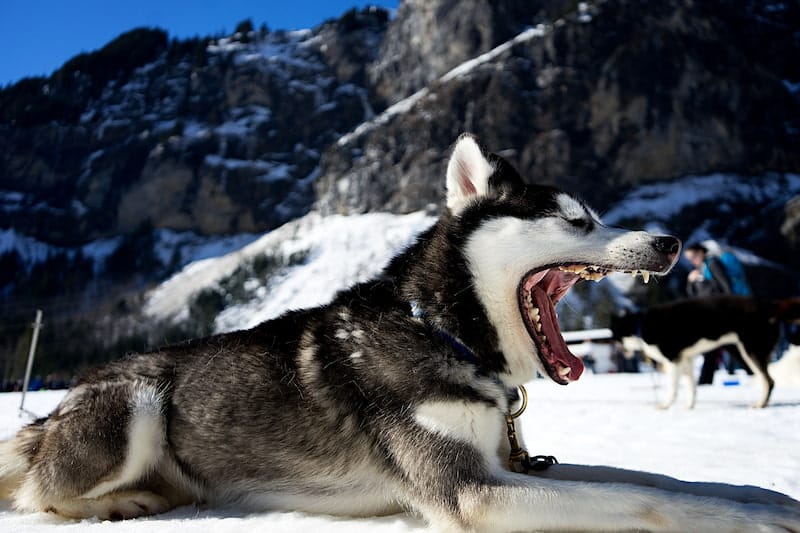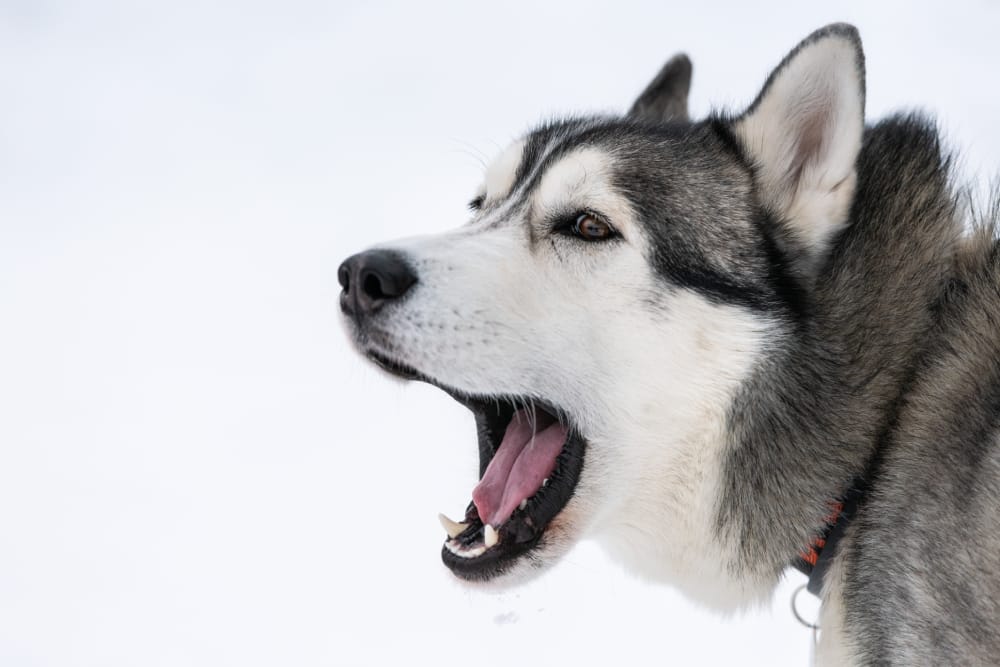Introduction
Getting to Know Huskies and How They Talk
Siberian Huskies are famous for their good looks and playful personality, but what really makes them stand out is their unique way of communicating. Unlike some dogs that just bark, Huskies have a wide range of sounds that show what they’re feeling or what they need. Knowing how your Husky talks is super important as it helps you connect better and tackle any behavior issues that might pop up.
Huskies have some interesting ways of communicating:
- Screaming: This usually means they’re excited, anxious, or frustrated.
- Howling: They use howls to reach out to other dogs or to get some attention.
- Whining: This sound usually shows they’re stressed or looking for some love.
- Barking: You don’t hear this one as much, but it can show excitement or alertness.
Once you get the hang of what these sounds mean, you can respond better to your furry friend. For instance, when a Husky screams, it could be their way of asking to play, while a howl might be in reaction to some noise around.
The Vocal Side of Huskies
Huskies are quite the talkers, and this comes from their past as sled dogs. They were initially bred by the Chukchi people in Siberia, who relied on voice communication to work together during long journeys in the snow. Their variety of sounds, from high-pitched screams to deep howls, help them express themselves and stay connected with their pack.
One Husky owner shared that her dog howls whenever he hears sirens or trains nearby. Instead of just being noises, these moments turn into fun interactions, showing off how playful Huskies can be. When you train them well and understand their vocal quirks, it can lead to a happy and connected relationship.

Why Huskies Howl
It’s Just in Their Nature
Huskies are well-known for howling, and it’s part of their instinct. This behavior is tied to their ancestry as sled dogs and their connection to wolves. In nature, wolves howl to communicate with their pack, to mark their territory, and to signal whereabouts. Since Huskies have these traits in them, howling is just in their genes.
If you’re a Husky owner, you’ve probably seen your dog join in a howling session when they hear a siren. One owner mentioned how his Husky howls along with emergency vehicle sounds, kinda like he’s joining the band. This instinct is not just about gathering the pack but also how they express their feelings based on what’s going on around them.
Some instinctual reasons they howl include:
- Talking to other dogs: Howling helps them connect with nearby dogs or those out in the wild.
- Building bonds: When a group of Huskies howl together, it builds a sense of family within the pack.
Why Do They Howl?
Besides instinct, howling is an important way for Huskies to communicate. They might howl to show excitement, frustration, or simply to get some attention. If a Husky feels ignored, they might let out a heartfelt howl to express their wish for companionship.
Here are some reasons Huskies might start howling:
- Looking for attention: A bored Husky could howl to get you to play with them.
- Responding to loud noises: Whether it’s a siren or music, Huskies often join in with their own howls.
- Expressing emotions: Howling can show happiness, urgency, or stress.
In short, a Husky’s howl is more than just a noise; it’s how they share their feelings and stay connected to their family. Understanding these sounds can help you bond better with your Husky, making for a happier home.

Why Huskies Whine
Wanting Attention
Whining is a common sound you’ll hear from Huskies and German Shepherd Dogs, and it usually means they want some attention. Both breeds love socializing and thrive on interaction. Like one Husky owner named Sarah, who noticed her dog, Luna, would whine a lot when ignored. During movie nights or quiet times, Luna’s soft whines would soon become loud cries for attention until Sarah gave her a scratch behind the ears.
German Shepherd Dogs also tend to whine when they feel left out, especially when they’re eager to join in or get moving. Their loyalty and sensitivity often make them more vocal when seeking connection.
These dogs might whine for various reasons when they need attention:
-
Play requests: They want to play games or go for walks.
-
Wanting company: Being pack animals, they often feel alone and vocalize to be near you.
-
Learning limits: If they’re ignored, they might whine louder, hoping to grab your attention.
If you respond positively when they whine for attention, it encourages better communication habits.
Showing Discomfort
Sometimes whining can be a signal that a Husky isn’t feeling good. This discomfort could come from physical problems or emotional stress. For instance, another owner, John, noticed that his dog, Max, whined in a high-pitched tone when he stepped on something sharp during a walk. That whine was not just asking for attention but a cry for help.
Some common reasons for whining due to discomfort include:
- Physical pain: Injuries or health issues could cause whining as a way of signaling distress.
- Anxiety: New places or loud sounds can lead to stress-induced whining.
- Unmet needs: If a Husky needs to go out or is hungry, their whining can clearly show their needs.
Figuring out why your Husky is whining can strengthen the bond between you and your furry friend, leading to better communication and care. Whether it’s for attention or discomfort, paying attention to these sounds is key for keeping your Husky happy and healthy.
Huskies Yelling: What Does It Mean?
Protecting Their Space
Huskies are known for being vocal, and yelling often acts as a warning or a way to mark their territory. This behavior is part of their instinct to guard and patrol their area. One owner named Mark shared how his dog, Koda, would bark and yell whenever someone came near their house. This was Koda’s way of telling Mark to be alert for potential intruders or simply saying, “This is my home!”
Territorial yelling from Huskies can pop up in different situations:
- Greeting visitors: When guests come over, Huskies might yell to show they’re there.
- Alerting to noises: Loud vehicles, other dogs barking, or even footsteps can trigger their barks.
- Spotting strange animals: If Koda saw a cat outside, his yelling was both a warning to the intruder and a message to his owner.
Knowing this behavior helps owners understand their Huskies’ protective side and can guide appropriate training to manage any excessive barking.
Their Emotions
Aside from marking their territory, yelling can also show how a Husky feels. Being a vocal breed means that they often express their emotions openly. For example, a young Husky called Bella would let out happy yells whenever her owner came home after work. Her excitement was clear from her loud sounds, wagging tail, and energetic jumps.
Emotional reasons for yelling can include:
- Excitement: Such as welcoming their owners back after being apart or during playtime.
- Frustration: Like when they can’t reach a toy or want to play with pets that are just out of reach.
- Anxiety: Common in Huskies who experience separation anxiety, often leading them to make loud vocalizations.
Understanding what triggers your Husky’s yelling can help build a stronger bond. With patience and the right training, you can help them express themselves in more positive ways, creating a loving home filled with understanding.
Handling Howling, Whining, and Yelling
Effective Training Tips
Dealing with a vocal Husky can feel tough at times, but with the right training, you can create a more peaceful environment. Positive reinforcement is key. One owner, Emily, found out that giving her Husky, Finn, treats and praise when he was quiet really helped cut down his howling at cars. Some good training tips include:
- Teach Commands: Use commands like “quiet” or “enough” to let your Husky know it’s time to lower the volume. Start using these commands when they’re calm and then during barking moments.
- Stay Consistent: Make sure everyone at home uses the same commands and reactions to barking. Mixed messages can confuse your dog and make the problem worse.
- Redirect Their Focus: If your Husky starts howling or whining, shift their attention with a toy or a fun activity. This can help reduce noise and make things more engaging.
With some patience and consistency, most Huskies can learn to get their messages across without being so loud.
Keeping Them Active
A well-exercised Husky tends to be a quieter one. These high-energy dogs need plenty of physical and mental activities to use their natural instincts and stave off boredom. One owner, Daniel, found that hiking with his dog, Luna, daily really cut down on her yelling at birds and squirrels. Here are some ideas for keeping your Husky exercised and stimulated:
- Regular Walks: Aim for at least one long walk or run every day to help your Husky use up their energy.
- Interactive Toys: Giving them puzzle toys can keep their minds busy and prevent boredom-related barks or whines.
- Playdates with Friends: Letting your Husky spend time playing with other dogs can provide the social interaction they love and release some pent-up energy.
By meeting your Husky’s mental and physical needs, you can cut down on excessive barking and promote a happier, well-rounded companion. With the right attention, your Husky’s vocal personality can be a charming part of life together.

When to Get Help
Spotting Behavioral Signs
While Huskies are naturally talkative and expressive, there are times when too much yelling, howling, or whining might mean there’s a problem. As a caring Husky parent, it’s important to stay alert and notice signs that could suggest your pup is having a tough time.
For instance, Emily, who loves her Husky, noticed her dog, Freya, started howling for long stretches and showing destructive behavior, like chewing on furniture and pacing. These actions may indicate that Freya wasn’t just vocalizing her needs but showing distress. Here are some signs that might mean your Husky needs help:
- Constant howling or screaming: If your Husky howls for a long time, especially when you leave, that could signal separation anxiety.
- Destructive behaviors: Chewing or damaging things around the house can show stress or frustration.
- Changes in eating or energy: A sudden drop in their appetite or energy might signal emotional distress.
- Aggression towards others: If you notice growling or lunging, this needs immediate attention.
Spotting these signs early can help you deal with issues before they turn into serious problems.
Getting Professional Help
If you see any of these concerning signs, it’s a good idea to consult a vet or a dog trainer who knows about behavior. A vet can check for any health issues that might be making your Husky anxious or noisy. For instance, pain or discomfort can show up as vocalization, so making sure your Husky is healthy should always be a top priority.
Once any health parts are sorted, working with a pro trainer can provide great insights into your dog’s behavior. They can create a training plan that fits your Husky’s needs, focusing on positive methods and modifying behavior.
Often, a mix of vet support and training can lead to big improvements in your dog’s behavior. After working with trainers, many owners report their dogs’ excessive howling decreased, leading to a calmer home. Remember, getting help isn’t just about fixing problems; it’s about making sure your Husky has a happier, healthier life.

Leave a Reply